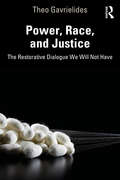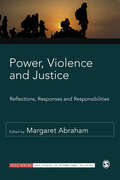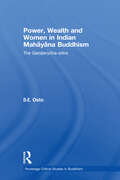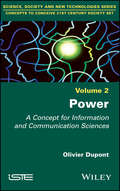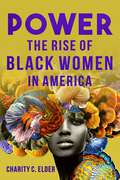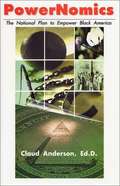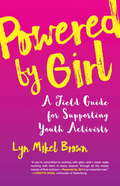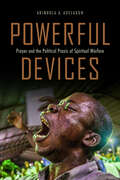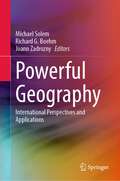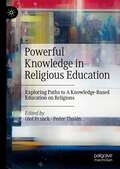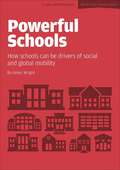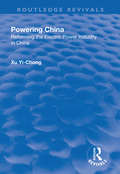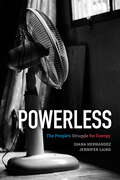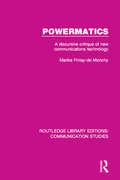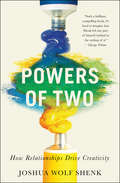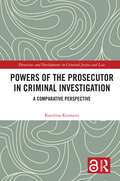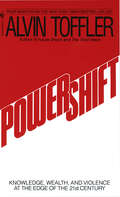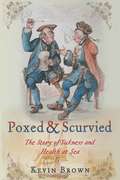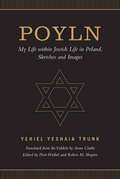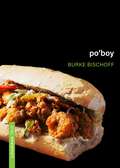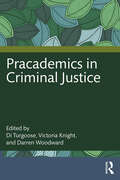- Table View
- List View
Power, Politics, and Paranoia
by Jan-Willem van Prooijen Paul A. M. van LangePowerful societal leaders - such as politicians and Chief Executives - are frequently met with substantial distrust by the public. But why are people so suspicious of their leaders? One possibility is that 'power corrupts', and therefore people are right in their reservations. Indeed, there are numerous examples of unethical leadership, even at the highest level, as the Watergate and Enron scandals clearly illustrate. Another possibility is that people are unjustifiably paranoid, as underscored by some of the rather far-fetched conspiracy theories that are endorsed by a surprisingly large portion of citizens. Are societal power holders more likely than the average citizen to display unethical behaviour? How do people generally think and feel about politicians? How do paranoia and conspiracy beliefs about societal power holders originate? In this book, prominent scholars address these intriguing questions and illuminate the many facets of the relations between power, politics and paranoia.
Power, Race, and Justice: The Restorative Dialogue We Will Not Have
by Theo GavrielidesWe are living in a world where power abuse has become the new norm, as well as the biggest, silent driver of persistent inequalities, racism and human rights violations. The COVID-19 socio-economic consequences can only be compared with those that followed World War II. As humanity is getting to grips with them, this timely book challenges current thinking, while creating a much needed normative and practical framework for revealing and challenging the power structures that feed our subconscious feelings of despair and defeatism. Structured around the four concepts of power, race, justice and restorative justice, the book uses empirical new data and normative analysis to reconstruct the way we prevent power abuse and harm at the inter-personal, inter-community and international levels. This book offers new lenses, which allow us to view power, race and justice in a modern reality where communities have been silenced, but through restorative justice are gaining voice. The book is enriched with case studies written by survivors, practitioners and those with direct experiences of power abuse and inequality. Through robust research methodologies, Gavrielides’s new monograph reveals new forms of slavery, while creating a new, philosophical framework for restorative punishment through the acknowledgement of pain and the use of catharsis for internal transformation and individual empowerment. This is a powerful and timely book that generates much needed hope. Through a multi-disciplinary dialogue that uses philosophy and critical theory, social sciences, criminology, law, psychology and human rights, the book opens new avenues for practitioners, researchers and policy makers internationally.
Power, Violence and Justice: Reflections, Responses and Responsibilities (SAGE Studies in International Sociology)
by Margaret AbrahamThis book brings together sociological insights, theoretical perspectives and global research to contribute to a deeper understanding of the complexities of contemporary power, violence, and justice. It explores a diverse range of urgent topics, including: colonialism, migration, race, gender and intersectionality, social movements, security, environment, and education. In doing so, it asks what the role of sociology is – and could be – in moving us forward. Both critical and hopeful, this collection stimulates us as researchers and as human beings. It challenges us to reflect, respond, and share in the responsibility of countering the forces that perpetrate violence, subvert equality, and dilute the notion of justice. With contributions from an array of distinguished international scholars, including several former International Sociological Association presidents, this is an essential reference work for researchers across the social sciences interested in power, violence, social justice, human rights, public sociology, social change and social movements. Margaret Abraham is Professor of Sociology and the Harry H. Wachtel Distinguished Professor at Hofstra University, USA. She is also a Past President of the International Sociological Association.
Power, Violence and Justice: Reflections, Responses and Responsibilities (SAGE Studies in International Sociology)
by Margaret AbrahamThis book brings together sociological insights, theoretical perspectives and global research to contribute to a deeper understanding of the complexities of contemporary power, violence, and justice. It explores a diverse range of urgent topics, including: colonialism, migration, race, gender and intersectionality, social movements, security, environment, and education. In doing so, it asks what the role of sociology is – and could be – in moving us forward. Both critical and hopeful, this collection stimulates us as researchers and as human beings. It challenges us to reflect, respond, and share in the responsibility of countering the forces that perpetrate violence, subvert equality, and dilute the notion of justice. With contributions from an array of distinguished international scholars, including several former International Sociological Association presidents, this is an essential reference work for researchers across the social sciences interested in power, violence, social justice, human rights, public sociology, social change and social movements. Margaret Abraham is Professor of Sociology and the Harry H. Wachtel Distinguished Professor at Hofstra University, USA. She is also a Past President of the International Sociological Association.
Power, Wealth and Women in Indian Mahayana Buddhism: The Gandavyuha-sutra (Routledge Critical Studies in Buddhism)
by Douglas OstoThis book examines the concepts of power, wealth and women in the important Mahayana Buddhist scripture known as the Gandavyuha-sutra, and relates these to the text’s social context in ancient Indian during the Buddhist Middle Period (0–500 CE). Employing contemporary textual theory, worldview analysis and structural narrative theory, the author puts forward a new approach to the study of Mahayana Buddhist sources, the ‘systems approach’, by which literature is viewed as embedded in a social system. Consequently, he analyses the Gandavyuha in the contexts of reality, society and the individual, and applies these notions to the key themes of power, wealth and women. The study reveals that the spiritual hierarchy represented within the Gandavyuha replicates the political hierarchies in India during Buddhism’s Middle Period, that the role of wealth mirrors its significance as a sign of spiritual status in Indian Buddhist society, and that the substantial number of female spiritual guides in the narrative reflects the importance of royal women patrons of Indian Buddhism at the time. This book will appeal to higher-level undergraduates, postgraduates and scholars of religious studies, Buddhist studies, Asian studies, South Asian studies and Indology.
Power/Knowledge: Selected Interviews and Other Writings 1972-1977
by Michel FoucaultMichel Foucault has become famous for a series of books that have permanently altered our understanding of many institutions of Western society. He analyzed mental institutions in the remarkable Madness and Civilization; hospitals in The Birth of the Clinic; prisons in Discipline and Punish; and schools and families in The History of Sexuality. But the general reader as well as the specialist is apt to miss the consistent purposes that lay behind these difficult individual studies, thus losing sight of the broad social vision and political aims that unified them. Now, in this superb set of essays and interviews, Foucault has provided a much-needed guide to Foucault. These pieces, ranging over the entire spectrum of his concerns, enabled Foucault, in his most intimate and accessible voice, to interpret the conclusions of his research in each area and to demonstrate the contribution of each to the magnificent -- and terrifying -- portrait of society that he was patiently compiling. For, as Foucault shows, what he was always describing was the nature of power in society; not the conventional treatment of power that concentrates on powerful individuals and repressive institutions, but the much more pervasive and insidious mechanisms by which power "reaches into the very grain of individuals, touches their bodies and inserts itself into their actions and attitudes, their discourses, learning processes and everyday lives" Foucault's investigations of prisons, schools, barracks, hospitals, factories, cities, lodgings, families, and other organized forms of social life are each a segment of one of the most astonishing intellectual enterprises of all time -- and, as this book proves, one which possesses profound implications for understanding the social control of our bodies and our minds.
Power: A Concept for Information and Communication Sciences
by Olivier DupontA polymorphous concept, power has imposed itself since ancient times. Whether it characterizes the phenomena of domination, exclusion or voluntary submission, it illuminates social relations and, since the 20th Century, interpersonal relations. This book offers, first of all, a daring panorama through its intertwining of different theoretical propositions relating to power, across time and across disciplines. It then presents the work of researchers in information and communication sciences who draw from these proposals the materials allowing them to develop their own analyses. These analyses revisit discursive power with respect to contemporary formations of communication and information. They investigate digital technologies by problematizing the phenomena of influence, control and access to knowledge. Finally, they reflect on the media in the light of inherent powers of social mediation, advertising and journalism.
Power: The Rise of Black Women in America
by Charity C. Elder&“Black women are dope because they rise and are yet rising. This dopeness is not hyperbolic or symbolic—rather, it is borne of persecution that has failed to frustrate a perseverant persistence to prevail.&”Before sea to shining sea. Before spacious skies were pierced by purple mountains. Before the uniting of one nation. Black women learned to rise. In POWER: THE RISE OF BLACK WOMEN IN AMERICA, award-winning journalist and digital media executive Charity C. Elder posits that there has never been a better time to be a Black woman in the United States.POWER is an incisive disquisition on Black womanhood weaving theoretical frameworks of history and sociology with poignant interviews, ethnographic observation, and anecdotes gleaned from history, social media, pop culture, and the author&’s lived experiences.Using data, the author substantiates the triumph of Black women. Original analysis of eighty years of US census data, prepared by the University of Minnesota and analyzed by Dr. Constance F. Citro, documents the remarkable ascension of Black women since the early twentieth century. An exclusive national survey conducted in partnership with the Marist Poll in 2021 not only reveals that 70 percent of Black women say they have been successful in life, but also that most believe they have the power to succeed.POWER does not shy away from the realities of structural oppression identified by the late Black feminist scholar bell hooks; rather it illuminates how Black women exercise agency to create meaningful lives. Success is not an anomaly, but a defining characteristic. Black women have amassed power—now, Elder posits, they need to acknowledge it and then wield the hell out of it.
PowerNomics: The National Plan to Empower Black America
by Claud AndersonPowerNomics analyses the complex web of racial monopolies and Black America's inappropriate behaviour patterns that are driving it into a permanent underclass status. Dr. Anderson proposes new concepts that teach Blacks new ways to see, think, and behave in race matters. His new education, political and economic action steps are designed to make Black America self-sufficient and competitive by the year 2005.
Powered by Girl: A Field Guide for Supporting Youth Activists
by Lyn Mikel BrownA playbook for working with and training girls to be activists of their own social movementsDrawing from a diverse collection of interviews with women and girl activists, Powered by Girl is both a journalistic exploration of how girls have embraced activism and a guide for adults who want to support their organizing. Here we learn about the intergenerational support behind thirteen-year-old Julia Bluhm when she got Seventeen to go Photoshop free; nineteen-year-old Celeste Montaño, who pressed Google to diversify their Doodles; and sixteen-year-old Yas Necati, who campaigns for better sex education. And we learn what experienced adult activists say about how to scaffold girls' social-change work. Brown argues that adults shouldn't encourage girls to "lean in." Rather, girls should be supported in creating their own movements--disrupting the narrative, developing their own ideas--on their own terms.From the Trade Paperback edition.
Powerful Devices: Prayer and the Political Praxis of Spiritual Warfare
by Abimbola Adunni AdelakunPowerful Devices studies spiritual warfare performances as an apparatus for disestablishing structures of power and knowledge, and establishing righteousness in their stead. Drawing on performance studies’ emphasis on radicality and breaking of social norms as devices of social transformation, the book demonstrates how Christian groups with dominant cultural power but who perceive themselves as embattled wield the ideas of performance activism. Combining religious studies with ethnography, Powerful Devices explores Nigerian Pentecostals and US Evangelicals’ praxis of transnational spiritual warfare. By closely studying spiritual warfare prayers as a “device,” Powerful Devices shows how the rituals of prayer enable an apprehension of time, paradigms of self-enhancement, and the subversion of politics and authority. A critical intervention, Powerful Devices explores charismatic Christianity’s relationship to science and secular authority, technology and temporality, neoliberalism, and reactionary ideology.
Powerful Geography: International Perspectives and Applications
by Richard G. Boehm Michael Solem Joann ZadroznyThis book presents the evolution of the Powerful Geography approach to teaching and learning in the United States and how the approach can be adapted and implemented in other countries. Powerful Geography acknowledges the remarkable diversity that exists in classrooms, the wide-ranging interests of modern students and the desire of these students to translate dynamic subject-matter into “useful” information and concepts, a process that is consistent with modern educational theory. For Powerful Geography to work in secondary and postsecondary education, teachers and university professors must adapt and teach geography as a critical training where individual students see opportunities to apply geography content, skills, and technology to real world problems that they care about. This book challenges geography educators at all levels to strengthen their applied curriculum in order to help students prepare for jobs and careers in broad areas such as climate change, migration, environmental protection, natural resources, energy development and use, transport planning, supply chain logistics, global trade, national security, and infrastructure.
Powerful Knowledge in Religious Education: Exploring Paths to A Knowledge-Based Education on Religions
by Olof Franck Peder ThalénThis book unites and explores different approaches to understand and develop knowledge-based religious education. While the importance of methodological issues in RE is understood and acknowledged, the editors and contributors interrogate what kind of knowledge should be explored, how this knowledge is defined and what the consequences would be. Subsequently, the book focuses on the concept of powerful knowledge which transcends students' everyday experiences, and how it can be incorporated into the RE curriculum. Drawing together international research from RE teaching and learning, the book explores various paths to integrate a truly knowledge-based religious education. The book will appeal to students and scholars of religious education, sociology of education and the philosophy of religion.
Powerful Schools: Schools as drivers of social and global mobility
by Helen WrightPowerful Schools seeks to release the creative vision within all educators, and show how schools can lead the way in establishing structures and practices that will support young people to become productive members of a global society. If educators are liberated to recognise that the vast potential of schools need not be constrained by expectations about qualifications, curriculum, the length of the school day, or physical buildings, then their imagination soars, as does their capacity for invention. Powerful Schools is a blueprint, showing how each and every school can grow abundantly rich in opportunities for individuals to develop the skills to become more socially and globally mobile, actively supported by numerous people and organisations who are consciously working to engage them in making the most of these opportunities.
Powerful Schools: Schools as drivers of social and global mobility
by Helen WrightPowerful Schools seeks to release the creative vision within all educators, and show how schools can lead the way in establishing structures and practices that will support young people to become productive members of a global society. If educators are liberated to recognise that the vast potential of schools need not be constrained by expectations about qualifications, curriculum, the length of the school day, or physical buildings, then their imagination soars, as does their capacity for invention. Powerful Schools is a blueprint, showing how each and every school can grow abundantly rich in opportunities for individuals to develop the skills to become more socially and globally mobile, actively supported by numerous people and organisations who are consciously working to engage them in making the most of these opportunities.
Powering China: Reforming the Electric Power Industry in China (Routledge Revivals)
by Xu Yi-chongThis title was first published in 2002: This study of the Chinese electric power industry examines the ownership and the restructuring of the industry. The reform of the electric power industry is also seen as part of the wider economic development that has been taking place in China, thus providing fresh perspectives on the changes taking place in both the economy and society more generally. Presenting a wealth of extensive research on the subject, the book elucidates the power struggle between political and bureaucratic elite and explains the sensitive and volatile relationship between the central and provincial government against an increasingly complex global background.
Powerless: The People's Struggle for Energy
by Diana Hernández Jennifer LairdEnergy serves as the lifeblood of our daily experiences. It permeates virtually every aspect of our existence, facilitating nourishment, safety, and productivity. When affordability threatens energy’s availability, a family’s living situation can become untenable—too cold, too hot, too dark, and too often, unhealthy and unsafe. In Powerless, sociologists Diana Hernández and Jennifer Laird reveal the hidden hardship of “energy insecurity” – the inability to adequately meet household energy needs. Approximately one in ten households in the U.S. are energy insecure and four in ten are at risk for energy insecurity. These statistics alone do not convey the acute pain of utility shutoffs, or the relentless toll of chronic energy hardships marked by difficult choices and harsh living conditions. Drawing on survey data and interviews with one hundred energy-insecure individuals and families, Hernández and Laird detail the experience of energy insecurity. Individuals and families suffering from energy insecurity endure economic hardships, such as difficulty paying utility bills, utility debt, and disconnection from utility services. They also struggle with physical challenges, such as poor housing conditions and poor or dysfunctional heating and cooling systems. They are often forced to make difficult choices about what bills to pay. These decisions are sometimes referred to as “heat or eat?” choices, as families cannot afford to pay for heating and food at the same time. Energy insecure individuals and families employ a variety of strategies to keep energy costs down to avoid having to make these hard choices. This includes deliberate underconsumption of energy, enduring physical discomfort, and using dangerous alternatives such as open flames, ovens, or space heaters to try to maintain a comfortable temperature in their home. To be energy insecure is to suffer. Despite the heavy toll of energy insecurity, most people confront these difficulties behind closed doors, believing it is a private matter. Thus, the enormous social crisis of energy insecurity goes unnoticed. Hernández and Laird argue that household energy is a basic human right and detail policies and practices that would expand access to consistent, safe, clean, and affordable energy. Their proposals include improving the current energy safety net, which is limited and often does not serve the most energy insecure due to stringent program requirements and administrative burdens. They also suggest redesigning rates to accommodate income, promoting enrollment and expansion of discount programs, reforming utility disconnection policies, improving energy literacy, and ensuring an equitable shift to renewable energy resources. Powerless creates a comprehensive picture of the complex social and environmental issue of energy insecurity and shows how energy equity is not just an aspiration but an achievable reality.
Powermatics: A Discursive Critique of New Communications Technology (Routledge Library Editions: Communication Studies #5)
by Marike Finlay - de MonchyOriginally published in 1987. This critical work is an exploration of new communications technology in its social context, as a social discourse determined by other forms of inter-play. The author refers to Weber, Innis, Habermas and Foucault to develop her argument.
Powers of Two: How Relationships Drive Creativity
by Joshua Wolf ShenkThe power of collaboration, from Lennon and McCartney to Wozniak and Jobs: &“An inspiring book that also happens to be a great read&” (Daniel H. Pink, author of Drive). Throughout history, partners have buoyed each other to better work—though often one member is little known to the general public. (See Warren Buffett and Charlie Munger, or Vincent and Theo van Gogh.) Powers of Two draws on neuroscience, social psychology, and cultural history to present the social foundations of creativity, with the pair as its primary embodiment. Revealing the six essential stages through which creative intimacy unfolds, this book shows how pairs begin to talk, think, and even look like each other; how the most successful ones thrive on conflict; and why some cease to work together while others carry on. At once intuitive and deeply surprising, Powers of Two will reshape the way you view individuals, relationships, and society itself. &“A rare glimpse into the private realms of duos . . . A natural storyteller.&” —The New York Times &“A book about magic, about the Beatles, about the chemistry between people, about neuroscience, and about the buddy system; it examines love and hate, harmony and dissonance, and everything in between . . . Wise, funny, surprising, and completely engrossing.&” —Susan Orlean &“We sometimes think of creativity as coming from brilliant loners. In fact, it more often happens when bright people pair up and complement each other. Shenk&’s fascinating book shows how to spark the power of this phenomenon.&” —Walter Isaacson &“Surprising, compelling . . . Shenk banishes the idea of solitary genius by demonstrating that our richest art and science come from collaboration: we need one another not only for love, but also for thinking and imagining and growing and being.&” —Andrew Solomon
Powers of the Prosecutor in Criminal Investigation: A Comparative Perspective
by Karolina KremensThis comparative analysis examines the scope of prosecutorial powers at different phases of criminal investigation in four countries: the United States, Italy, Poland, and Germany. Since in all four the number of criminal cases decided without trial is constantly increasing, criminal investigation has become central in the criminal process. The work asks: who should be in charge of this stage of the process? Prosecutors have gained tremendous powers to influence the outcome of the criminal cases, including powers once reserved for judges. In a system in which the role of the trial is diminishing and the significance of criminal investigation is growing, this book questions whether the prosecutor's powers at the early stage of the process should be enhanced. Using a problem-oriented approach, the book provides a parallel analysis of each country along five possible spheres of prosecutorial engagement: commencing criminal investigation; conducting criminal investigation, undertaking initial charging decisions; imposing coercive measures; and discontinuing criminal investigation. Using the competing adversarial–inquisitorial models as a framework, the focus is on the prosecutor as a crucial figure in the criminal process and investigation. The insights of this book will be of interest and relevance to students and academics in criminal justice, criminology, law, and public policy, as well as policymakers, government officials, and others interested in legal reform.
Powershift: Knowledge, Wealth, and Power at the Edge of the 21st Century
by Alvin TofflerAlvin Toffler&’s Future Shock and The Third Wave are among the most influential books of our time. Now, in Powershift, he brings to a climax the ideas set forth in his previous works to offer a stunning vision of the future that will change your life. In Powershift, Toffler argues that while headlines focus on shifts of power at the global level, equally significant shifts are taking place in the everyday world we all inhabit—the world of supermarkets and hospitals, banks and business offices, television and telephones, politics and personal life. The very nature of power is changing under our eyes. Powershift maps the &“info-wars&” of tomorrow and outlines a new system of wealth creation based on individualism, innovation, and information. As old political antagonisms fade, Toffler identifies where the next, far more important world division will arise—not between East and West or North and South, but between the &“fast&” and the &“slow.&” In Powershift, Alvin Toffler has formulated the deepest, most comprehensive synthesis yet written about the civilization of the twenty-first century. It is one of the most important books you will ever read. Praise for Powershift &“[A] sweeping synthesis . . . by placing the accelerated changes of our current information age in the larger perspective of history, Mr. Toffler helps us to face the future with less wariness and more understanding.&”—The New York Times Book Review &“An insightful guide to a bewildering present and a frightening future . . . thought-provoking on every page.&”—Newsday
Poxed & Scurvied: The Story of Sickness and Health at Sea
by Kevin Brown&“A fascinating and wide-ranging history of health, hygiene, and the sea. This is a great narrative of an important but often hidden aspect of seafaring.&” —Ausmarine When European sailors began to explore the rest of the world, the problem of keeping healthy on such long voyages became acute. Malnourishment and crowded conditions bred disease, but they also carried epidemics that decimated the indigenous populations they encountered and brought back new diseases like syphilis. As navies developed, the well-being of crews became a dominant factor in the success of naval operations, so it is no surprise that the Royal Navy led the way in shipboard medical provision, and sponsored many of the advances in diet and hygiene which by the Napoleonic Wars gave its fleets a significant advantage over all its enemies. These improvements trickled down to the merchant service, but the book also looks at two particularly harsh maritime environments, the slave trade and emigrant ships, both of which required special medical arrangements. Eventually, the struggle to improve the fitness of seamen became a national concern, manifest in a series of far-reaching and sometimes bizarre public health measures, generally directed against the effects of drunkenness and the pox. In this way, as in many others, an attempt to address the specific needs of the seafarer developed wider implications for society as a whole. It also produced scientific breakthroughs that were a universal benefit, so far from being a narrow study of medicine at sea, this book provides a fascinating picture of social improvement. &“The topics are intriguing, the research is thorough, and the book is a captivating read.&” —Nautical Research Journal
Poyln: My Life within Jewish Life in Poland, Sketches and Images
by Yehiel Yeshaia TrunkOriginally published between 1944 and 1953, Poyln (Poland) is one of the treasures of Yiddish literature. Despite its reputation, the book has not been fully translated into English until now. Written by Yehiel Yeshaia Trunk, a prominent Polish Jewish writer, Poyln is a colourful epic, a moving testimony, and an important primary historical source that presents a portrait of Polish Jewry against the backdrop of the Nazi genocide. The undisputed hero of the story is the national community of Polish Jews. To portray this community, Trunk creates a rich gallery of characters - Hassidic patricians, timber merchants, rich landowners, brilliant Talmudists, Orthodox rabbis, and Hasidic tsadikim. He also depicts ordinary village and small-town Jews, artisans, shopkeepers, workers, and Luftmenschen, all of them members of one extended family. Particularly valuable aspects of Poyln are its examination of different trends in the Hasidic movement and the author's attempt to bridge the gap between his secular generation and its religious ancestors. In short, Trunk's work aims to show Jewishness as a way of life. This is the first instalment of a multi-volume edition of Poyln, the first English translation to be published. Here begins a story of the beauty and pathos of the world of Polish Jewry, a world that was almost totally destroyed by the Nazis.
Po’Boy (Louisiana True)
by Burke BischoffPo’Boy tells the story of how a humble sandwich became a symbol of New Orleans culture, history, and cuisine. Invented to help feed a crowd of out-of-work individuals in New Orleans’s streetcar industry, the po’boy is a submarine-like sandwich served on French bread, with common fillings that include fried seafood, roast beef and gravy (“debris”), and hot sausage. Rich with historical detail, Po’Boy welcomes readers into the world of the city’s most iconic sandwich.
Pracademics in Criminal Justice
by Victoria Knight Di Turgoose Darren WoodwardProviding an in-depth interrogation of the practitioner/academic role within the context of criminal justice, this book outlines the benefits and challenges of different roles through exploring the lived experience of the contributing authors.Arranged into three comprehensive sections, the book acknowledges the contribution pracademics make to criminal justice, conceptualises pracademia in the criminal justice context and explores what it means to be a pracademic in the criminal justice setting. Exploring the theoretical, methodological, philosophical, practice and pedagogic value that practical application brings to teaching, learning and research, the book collectively develops a pracademic model framed within the context of criminal justice, which challenges the established ‘historical/traditional’ wisdom of academia with the aim of disrupting traditional knowledge production, contributing to new discussions and highlighting the value of scholarship grounded in practice in criminal justice.Written and edited by pracademics with extensive criminal justice experience, Pracademics in Criminal Justice will be of value to anyone with an interest in how practice and academia intertwine in a criminal justice setting, including pracademics, academics, practitioners, applied academics, those with lived experience of practice in academia, activists, practivists and students, particularly those undertaking professional programmes, in areas such as policing or probation, or seeking careers as practitioners in the criminal justice system.

